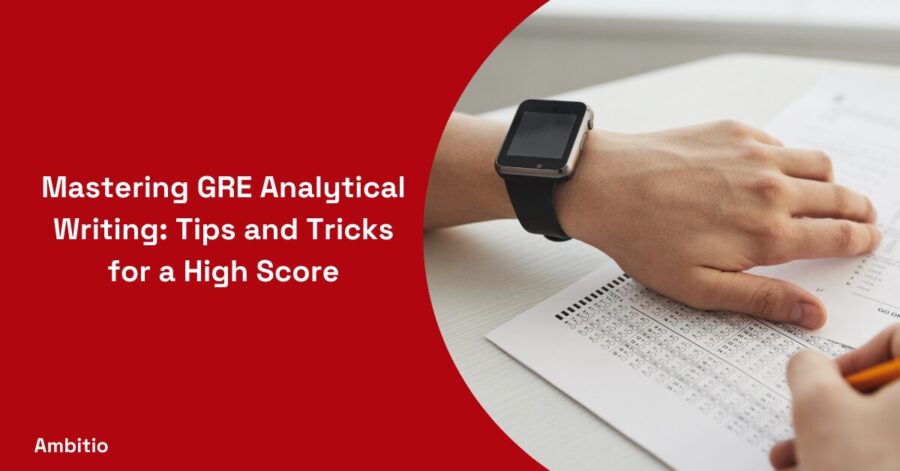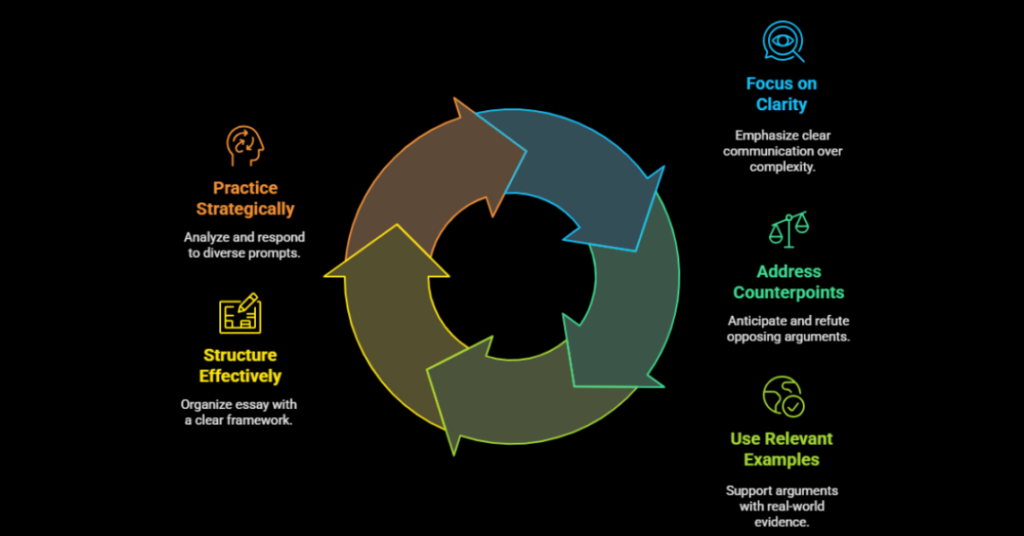25 June 2025
7 minutes read
What Is GRE AWA (GRE Analytical Writing Score)?

Key Takeaways
- AWA GRE is not just about writing but proving you can think, argue, and structure ideas under pressure
- Know the difference between issue and argument essays to avoid losing easy points
- Use real examples, not generic fluff, and break down prompts with logic, not jargon
Every year, thousands of test-takers crush the Quant and Verbal sections of the GRE test—only to get blindsided by a lesser-known beast: the AWA. Yes, the Analytical Writing Assessment. It’s not just about writing an essay—it’s about crafting a response in which you discuss complex issues, take a clear position on the issue, and defend it with sharp reasoning and solid examples. And no, stuffing big words won’t help. ETS sees right through it.
Most students bomb the AWA section of the GRE not because they can’t write, but because they don’t know what to write. They fumble with prompts that ask whether they agree or disagree with a statement or to what extent they hold true and explain their position. Clarity? Missing. Structure? Lost. And the worst part? It silently drags down your GRE exam score. The good news? A bit of strategy, the right essay topics, and a well-practiced response format can flip this section from a weakness into a weapon.
What Is GRE Analytical Writing Section All About?
Before we dive into the tips and tricks, let’s understand what the GRE AWA section entails. This section consists of two essays: the Issue Essay and the Argument Essay. Each essay assesses your ability to analyze arguments, think critically, and express your thoughts coherently within a limited time frame.
The Importance of AWA in Your GRE Journey
While the AWA section doesn’t directly contribute to your GRE score (which ranges from 130 to 170 for each of the Verbal and Quantitative sections), it plays a significant role in your graduate school application. Admissions committees use your AWA essays to evaluate your writing skills, analytical thinking, and your ability to communicate effectively – all essential qualities for success in graduate studies.
How To Structure GRE AWA Topics?
Most GRE test takers treat the AWA section like an afterthought, and it shows. They spend hours grinding quant problems, memorizing vocab, and taking one practice test after another—then panic when they’re asked to “explain how the argument depends on unstated assumptions.” Suddenly, all that prep turns to dust. This isn’t just writing—it’s a stress test of your critical thinking and analytical writing skills. And if you don’t have a go-to structure for these analytical writing tasks, you’re toast.
Here’s the short, sharp structure that works every time:
1. Know the Essay Type First
Understand what you’re being asked to do. Issue essays require you to build an argument using reasons and examples to support your opinion. Argument essays, on the other hand, ask you to take apart someone else’s claim—spot assumptions, find flaws, and explain how the argument depends on weak logic. Confusing the two leads to fundamental mistakes. Know the task, or fail the section.
2. Use This Simple 5-Paragraph Format
Stick to a clean five-paragraph format. For issue essays, open with a clear position, support it with two solid examples, throw in a quick counterpoint if needed, and finish strong. For argument essays, start by summarizing the flawed claim, then dedicate each paragraph to one logical flaw, discussing what questions would help to evaluate it. Wrap up with suggestions for how the argument could be improved. This isn’t creative writing—this is structured, strategic writing.
3. Practice Smart, Not Hard
Use real GRE AWA topics from the ETS website, and write with the structure in mind. Don’t memorize—analyze. Then read essay responses and rater commentary to see what a high score really looks like. That’s how you actually improve your GRE AWA game.
5 Amazing Tips To Excel In GRE AWA Section
The AWA section of the GRE isn’t just about writing tasks—it’s about critical thinking, logical reasoning, and being crystal clear about where you stand. And it’s not optional. Even if you ace the Quant section, a weak AWA score screams: “I can’t build or break down an argument.” You don’t want that label. So here’s the real stuff—not tips you’ve read a hundred times, but sharp, strategic moves that actually boost your performance.
1. Stop Trying to Impress – Just Be Clear
Nobody cares if you use “juxtaposition” or “ontological framework.” If your position on the issue is murky, you lose. What ETS wants is a response in which you discuss the issue clearly, take a stand (agree or disagree), and explain it logically. Your job? Show them you can build a structured argument—not write a TED Talk transcript. Clarity always beats complexity.
2. Don’t Just Take a Side—Demolish the Opposite One
A killer move most test-takers skip: address the most compelling reasons that could be used to challenge your position. Why? Because it shows you’ve thought it through. You’re not blindly agreeing or disagreeing—you’re evaluating. The GRE analytical writing section rewards test-takers who can predict counterpoints and dismantle them logically. That’s how you separate yourself from 90% of the herd.
3. Use Real-World Examples That Actually Matter
Generic examples? Trash. “Technology is advancing every day” or “social media has pros and cons” will put your essay to sleep. Instead, use AWA GRE examples that could be used to make a point—real historical events, studies, or policies. Think of an issue essay as a courtroom. Evidence wins. Fiction fails. If you can’t back it up, don’t write it down.
4. Master the Art of Structure (Like a Lawyer, Not a Poet)
Here’s the cold truth: your essay response is being skimmed, not studied. ETS graders don’t have time to decode your abstract poetry. You need a tight framework: intro, body, rebuttal, conclusion. Use paragraphs with distinct purposes. Think: make a point, back it up, counter a challenge, close it strong. Don’t write to impress—write to communicate. It’s not creative writing. It’s strategic argumentation.
5. Practice with Real GRE Test Essay Prompts – But Don’t Memorize
Practicing on real ETS issue topics is gold. Memorizing them? Useless. Why? Because GRE loves remixing. You might get a familiar prompt—but with a twist. So instead of rote learning, train your brain to analyze any statement and explain your reasoning quickly. Your job is to spot flaws, structure an argument, and respond with precision—no matter how the prompt is phrased. It’s not a memory game. It’s a thinking game.
Utilizing Resources for GRE AWA Preparation
Preparing for the GRE AWA section involves more than just knowing the tips and tricks.

Here’s how you can make the most of available resources:
Practice, Practice, Practice
One of the most effective ways to improve your AWA skills is through practice. ETS, the organization that administers the GRE, provides a pool of official AWA topics and sample essay responses on their website. Practice writing essays under timed conditions to simulate the test environment.
Review Sample Essays with Rater Commentary
ETS also offers sample essays with rater commentary, which can provide valuable insights into what makes a strong AWA essay. Pay attention to the strengths and weaknesses of these essays to refine your writing.
GRE Prep Books and Online Resources
Consider using GRE preparation books and online resources that offer AWA practice tests and essay prompts. Many of these resources provide valuable strategies for approaching AWA tasks.
GRE Preparation Courses
If you’re seeking comprehensive preparation, consider enrolling in GRE preparation courses. These courses often include AWA-focused lessons and guidance from experienced instructors.
Word Processor Practice
Since you’ll be typing your essays on a computer using a word processor developed by ETS, it’s essential to practice using this tool. Familiarity with the word processor can save you valuable time on test day.
Conclusion
AWA isn’t just some warm-up round before the “real” GRE sections. It’s a skill test—one that checks how clearly you can think and how well you can argue under pressure. If you’re taking the GRE General Test, skipping the AWA is not an option. The way you handle the issue and argument essays says a lot about how ready you are for graduate-level work.
Whether you’re asked to state the extent to which you agree, or to disagree with the claim entirely, your reasoning for the position has to be airtight. No fluff. Just logic, structure, and purpose. And when a prompt pushes you to disagree with the statement, don’t just rant—debunk it with examples that actually land.
Navigate your path to GRE success with Ambitio’s precision preparation. Designed for ambitious students, our platform provides a strategic approach to the GRE, offering in-depth content review, practice tests, and personalized feedback to optimize your study time and results.
FAQs
What is the GRE Analytical Writing (AWA) section?
The GRE AWA section is part of the GRE General Test, where you are required to write two essays: an Issue Essay and an Argument Essay. It assesses your ability to think critically, analyze arguments, and express your thoughts effectively.
What is the importance of the AWA section in the GRE?
While the AWA section doesn’t contribute to your overall GRE score, it’s still a crucial part of your application to graduate programs. Admissions committees use it to evaluate your writing skills and critical thinking abilities.
How should I structure my AWA essays?
Your AWA essays should have a clear structure: an introduction, body paragraphs, and a conclusion. Make sure to provide evidence and examples to support your points and address counterarguments.
How can I prepare for the GRE AWA section effectively?
Start by familiarizing yourself with the types of prompts you might encounter. Practice writing essays under timed conditions, and review sample essays with rater commentary. Focus on improving your critical thinking and analytical writing skills.
Are there any specific tips for the Issue Essay and Argument Essay?
For the Issue Essay, take a clear stance and support it with relevant examples. In the Argument Essay, identify and critique the assumptions made in the argument, and provide alternative explanations or evidence when necessary.
Is using a word processor necessary for the GRE AWA section?
Yes, you will write your AWA essays on a computer using a word processor developed by ETS. It’s important to practice typing your essays and using the provided tools before the actual test.
How can I manage my time effectively during the AWA section?
Allocate about 30 minutes for each essay. Use the first few minutes to plan your response and outline your essay. Focus on writing a well-structured, coherent essay within the time limit.
Can you suggest any resources for GRE AWA practice?
ETS provides official GRE AWA topics and sample essay responses on their website. Additionally, consider using GRE prep books and online resources that offer AWA practice tests and essay prompts.
Should I use complex vocabulary in my AWA essays?
While it’s important to convey your ideas clearly, avoid using overly complex vocabulary if it doesn’t enhance your writing. Focus on precise and effective language to communicate your points.
How can I improve my analytical writing skills for the GRE AWA section?
Reading extensively, practicing writing, and seeking feedback on your essays are essential for improvement. Consider taking GRE preparation courses that offer guidance on AWA.

You can study at top universities worldwide!
Get expert tips and tricks to get into top universities with a free expert session.
Book Your Free 30-Minute Session Now! Book a call now




























